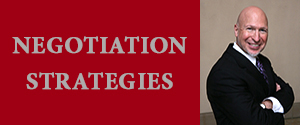

Introduction
When we are engaged in a negotiation, we see our primary role as that of a negotiator. We are a party to the negotiation, and as such, we do our utmost to assert our positions, demands and needs in the best way we know how.
Often, despite our best efforts, our negotiations fail, or meander along a lengthy unproductive path resulting in eroded relationships and sub-optimal outcomes. To mitigate the chances of a failed or sub-optimal negotiation, we need to learn to play a dual role at the negotiation table - both that of negotiator and that of mediator!
Consider the July 2012 collective bargaining negotiations between the NHL (National Hockey League) and the NHLPA (NHL Players' Association) for a renewed contract before the September 15th expiration of the existing contract. One of the more aggressive demands of the NHL was to reduce players' revenue shares from 57% to 43%, a proposal that understandably was not well received by the NHLPA.
The negotiators were unable to reach any agreement at all which eventually resulted in a 113 day lockout!
Often, despite our best efforts, our negotiations fail, or meander along a lengthy unproductive path resulting in eroded relationships and sub-optimal outcomes. To mitigate the chances of a failed or sub-optimal negotiation, we need to learn to play a dual role at the negotiation table - both that of negotiator and that of mediator!
Consider the July 2012 collective bargaining negotiations between the NHL (National Hockey League) and the NHLPA (NHL Players' Association) for a renewed contract before the September 15th expiration of the existing contract. One of the more aggressive demands of the NHL was to reduce players' revenue shares from 57% to 43%, a proposal that understandably was not well received by the NHLPA.
The negotiators were unable to reach any agreement at all which eventually resulted in a 113 day lockout!



